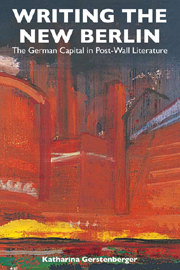Book contents
- Frontmatter
- Contents
- Acknowledgments
- Introduction: Newness and Its Discontents: Berlin Literature in the 1990s and Beyond
- 1 Erotic Sites: Sexual Topographies after the Wall
- 2 Bodies and Borders: The Monsters of Berlin
- 3 Multicultural Germans and Jews of Many Cultures: Imagining “Jewish Berlin”
- 4 Goodbye to East Berlin
- 5 Looking for Perspectives: The Construction at Potsdamer Platz
- Conclusion
- Bibliography
- Index
Introduction: Newness and Its Discontents: Berlin Literature in the 1990s and Beyond
Published online by Cambridge University Press: 05 February 2013
- Frontmatter
- Contents
- Acknowledgments
- Introduction: Newness and Its Discontents: Berlin Literature in the 1990s and Beyond
- 1 Erotic Sites: Sexual Topographies after the Wall
- 2 Bodies and Borders: The Monsters of Berlin
- 3 Multicultural Germans and Jews of Many Cultures: Imagining “Jewish Berlin”
- 4 Goodbye to East Berlin
- 5 Looking for Perspectives: The Construction at Potsdamer Platz
- Conclusion
- Bibliography
- Index
Summary
Die größte Veränderung, fand er, war, daß alle meinten, es habe sich so viel verändert.
[The biggest change, he found, was that everyone thought so much had changed.]
— Jakob Arjouni, Magic HoffmannEven before the Berlin Wall had been fully dismantled, critics began to call for the one comprehensive novel that could explain what was happening to Germany and the Germans. This novel never appeared. Instead, writers created a patchwork body of about three hundred texts about a city whose postwar identity was disintegrating virtually overnight. In many ways, the experience of German unification was too diverse, too ambiguous, and too influenced by global developments to be captured by one novel. Moreover, beginning in the late 1980s, the idea of literature as a source for national identity and the writer as the nation's conscience had come under scrutiny. Not only the call for the quintessential Berlin novel but also its non-arrival marks the reorientation process in German culture and literature that is the topic of this study.
Berlin's history, its symbolism as a site of the Cold War as well as of unification, and the unprecedented building boom of the 1990s turned the city into a laboratory for a changing German identity. The question of how German identity was changing and how to evaluate the transformations triggered considerable debate, but generally this shift has been understood as a desire to transcend the defining power of the Nazi past and to achieve political and cultural normalization.
- Type
- Chapter
- Information
- Writing the New BerlinThe German Capital in Post-Wall Literature, pp. 1 - 23Publisher: Boydell & BrewerPrint publication year: 2008

